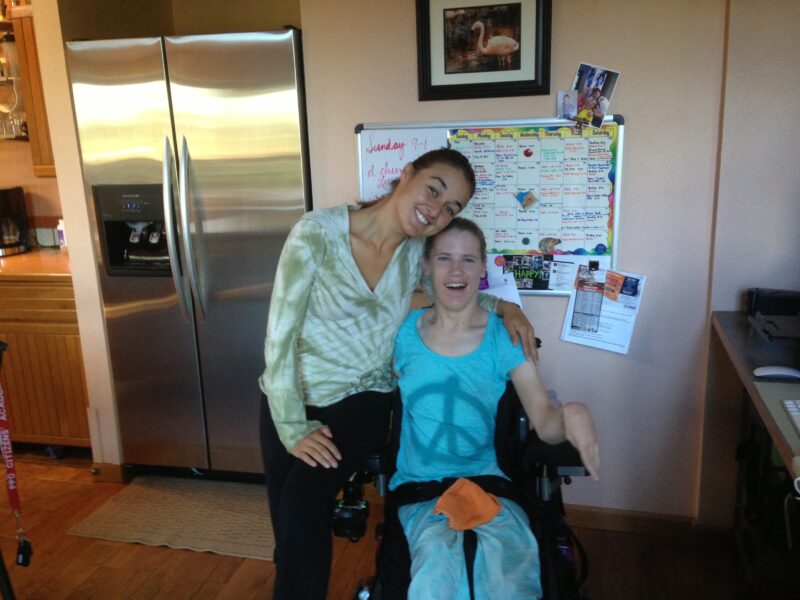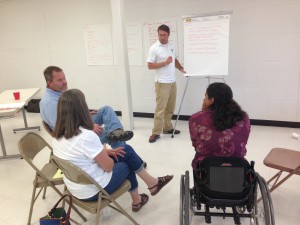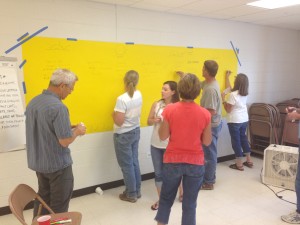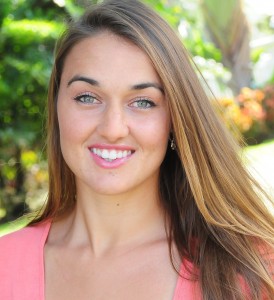I continue to be convinced that the answer to the national disability housing crisis can be found within local communities. Over Labor Day weekend, as Madison House Autism Foundation’s housing consultant, I traveled to Colorado and was welcomed by the Rocky Mountains and wild sage. During my trip, I had the pleasure of giving a presentation to Rooster Ranch, a small rural community with a big dream.
The stakes are high for parents. Through my travels, I have met many parents, and though they may be miles – or even oceans – apart, their vision is shared. They want to create empowering and safe homes for their adult children with abounding warmth and friendship. The demand for this vision is unprecedented as wait lists for services are exorbitantly long. Not to mention the fact that, in less than a decade, more than one million individuals with intellectual and/or developmental disabilities will lose their primary caregivers over the age of 60. As reflected by one 2012 report, there is a major lack of accountability, with more than 70% of people with disabilities claiming they’ve fallen victim to abuse and 90% claiming to have experienced abuse on more than one occasion.
Madison House Autism Foundation works with worried parents and groups across the country who are ready and willing to take action. We’ve found that the biggest hurdle groups face is putting the specific pieces together, asking the right questions, and preventing meetings from turning into cat herding. This is where I am honored to be of assistance. Whether it is over a weekend or several weeks, my goal is to get the ball rolling, prevent the wheel from being reinvented, share strategies others have found successful or unsuccessful, and to equip the community with the tools to organize.
The process begins with awareness: In a 2-3 hour presentation, I offer a broad overview of how others around the country and abroad have been providing a place to call home and a community that supports their needs and desires. The residential options I share are those which I personally have spent hours on-site talking to residents and staff for research while developing the Autism Housing Network .
“Desiree’s involvement really helped us choose the seeds in order for Rooster Ranch to grow in the right direction for our community.” –Jeff Galloway, OT and Hippotherapist
We then move into exploration and questioning: Without having much understanding of context, connections, and specific needs, it takes time to weed out and narrow down the desires of those around the table. The Rooster Ranch group proposes a rural community so getting consistent support services and quality therapists to drive out to the country will be a challenge for both families and professionals. Horseback riding and outdoor exercise, watching sunrise and sunsets, lots of assistive technology, lifelong learning opportunities and open space for community gatherings (movie nights, music and dance parties) were identified as important activities to include. Future residents and families are already connected and work together in this small community, thus the process will continue to grow from the bottom up in a non-hierarchical structure. Rooster Ranch has decided to commit to being a fully accessible, a neurodiverse community, providing on-site employment/recreation/educational opportunities for residents and offering multiple choices in service providers. It desires to serve the community through creating needed spaces and developing social enterprises that serve the local community.
Now for the nuts and bolts: It is time to lay out the plan that leads to action items and continued community organizing. Sitting all together, I share the specific focus areas and steps needed to give direction toward making Rooster Ranch a reality- and ask for volunteers! The diversity of time, talents, and contacts of those present in these gatherings and how they come together is magical- really, I get goosebumps every time! There is usually one or two people in each group who are detail oriented and master coordinators – these are the ones with whom I spend extra time going over the important tools for use in project management and communication.
Tears and laughter are inevitable during this process…conflict, confusion and disagreement will arise. Rooster Ranch is not an easy project (none of them are!), but I am confident that the trust and relationships being formed, expanding community commitment, along with very strong communication and management, will guide this project into existence.
“I am looking forward to Rooster Ranch because it seems like a fun place to live.”-potential future resident
Every group I work with is so different! They feed my passion, increase my knowledge, and imprint on my heart. Madison House Autism Foundation is dedicated to empowering local communities to solve the issues autistic adults and others with developmental disabilities face. I am lucky enough to have the honor to meet these heroes who will one day become leaders in their communities!
If you are part of a group that is ready to take on the challenge of creating your own local solution to provide housing for adults with autism, please send me an email at DKameka@madisonhouseautism.org or call Madison House Autism Foundation at 240-246-7140.
Desi’s Desk is a blog post written periodically by Desiree Kameka, Director of Community Education & Advocacy.
Desiree’s work for the Madison House Autism Foundation focuses on researching housing issues, advocating with organizations, families, and autistic adults on housing issues, and presenting her work at local and national gatherings. She visits many residential communities and social enterprises across the USA and abroad in order to highlight their unique victories and learning curves while sharing stories of residents with autism and other developmental disabilities. Desiree is also the project lead for Madison House’s interactive Autism Housing Network, which is currently in BETA testing. Her passion is empowering communities to create a future that is exciting and life affirming for those of all abilities by offering small group consultations for forming projects.




 MHAF Resources: Disability Connection’s “10 Things You Need to Know about Emergency Preparedness”
MHAF Resources: Disability Connection’s “10 Things You Need to Know about Emergency Preparedness”



Greetings ☺!